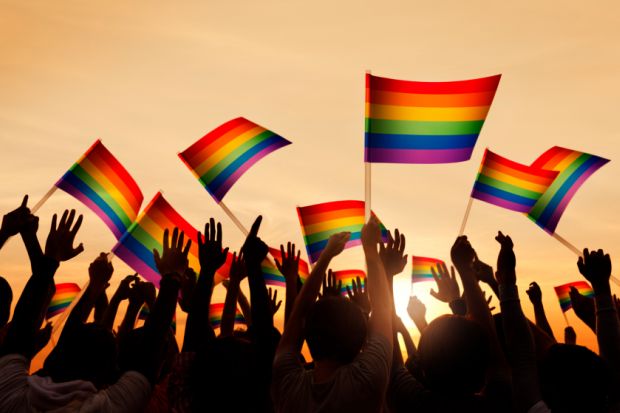With Pride month coming to an end, I have been reflecting on how my own personal journey has given me greater understanding of the challenges still facing LGBTQIA+ students – as well as those from other marginalised groups.
When I came out as a gay man aged 24, I felt enormous relief. It took a long time for me personally to accept being gay, but once I did, everything else fell into place and the turmoil went away almost overnight for me. While there is now much more acceptance of the LGBTQIA+ community since the 1970s and 1980s, research published by the campaign group Stonewall in 2018 revealed that 20 per cent of lesbian, gay and bisexual students and 16 per cent of trans students in the UK are not open to anyone in their family about their sexual orientation. At university, those figures drop to 13 and 15 per cent respectively, and the figures are consistent with a Ucas study in 2021, which also found that more students would be open about their sexuality in higher education (82 per cent) than at school (62 per cent).
The sector should be proud of this. These students should know that they don’t need to suffer too much pain because there are people and organisations that can provide support and understanding.
We know, however, that the suffering and pain does occur far too often. A separate Stonewall report in 2018 found that 68 per cent of LGBT people aged 18-24 had experienced depression, more than the general population (52 per cent). For students, contributory factors may include negative comments or conduct from other students (82 per cent), hiding that they are LGBT for fear of discrimination (42 per cent), feeling unable to wear clothes representing their gender expression (24 per cent), or being the victim of physical attacks (7 per cent).
I do believe the sector generally has a good position on support for LGBTQIA+ communities, but stark challenges remain, particularly around mental health. There is also still intolerance in wider society of LGBTQIA+ communities. Perhaps it has become more marginalised, but I really worry about how some of the narrative that was mobilised in the 1970s and 1980s against the gay community is now often mobilised against the trans community and others.
In that sense, people haven’t learned the lesson of gay liberation, which is that people should be free and supported to be themselves. Indeed, they have a right to be themselves – and that’s what society needs to enshrine.
Looking back on my own career, I feel remarkably privileged to be a vice-chancellor, but I’ve found it a slightly complex position to navigate because while I don’t want to particularly use my vice-chancellorship to wave flags about sexuality, I hope that my success signals to people that being very open about it need not be any barrier to attaining such a position.
I haven’t escaped the adverse reactions nor the awkward social situations, but this experience has helped me better understand how different marginalised groups feel. It helps me remember that when we are talking about issues such as race, age or disability, we’re talking about people and their stories.
People have struggled for generations trying to establish gay rights. I remember participating in Pride marches decades ago, at a time when those rights – for me, human rights – were under threat. We all need to stand up and make sure these rights stay – especially in higher education, where it is particularly important that everyone should be treated equally and provided with an environment free of fear or actual discrimination.
Pride is enormously important. When it is done right, it’s a wonderfully vibrant celebration of being part of humanity: of being recognised for who you are, not for who people would like you to be. Everyone, including universities, must learn from and embrace such a liberating phenomenon.
Nick Braisby is vice-chancellor of Buckinghamshire New University.
Register to continue
Why register?
- Registration is free and only takes a moment
- Once registered, you can read 3 articles a month
- Sign up for our newsletter
Subscribe
Or subscribe for unlimited access to:
- Unlimited access to news, views, insights & reviews
- Digital editions
- Digital access to THE’s university and college rankings analysis
Already registered or a current subscriber? Login








